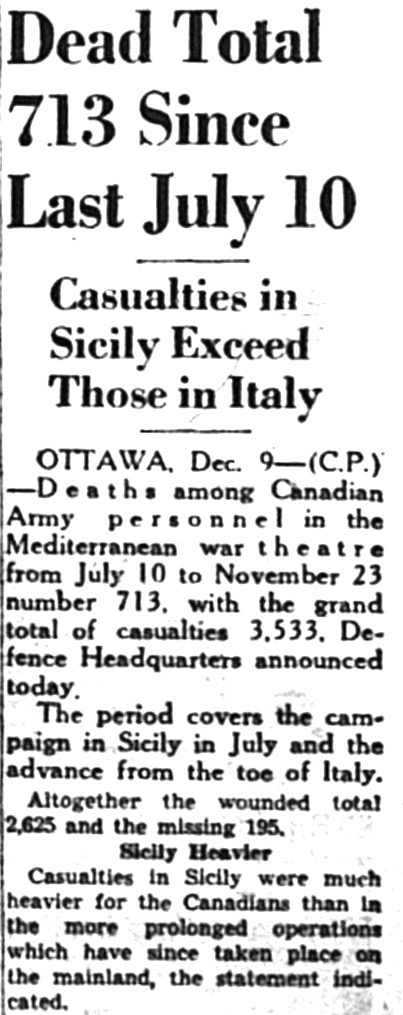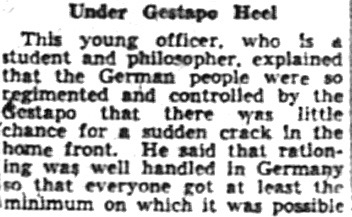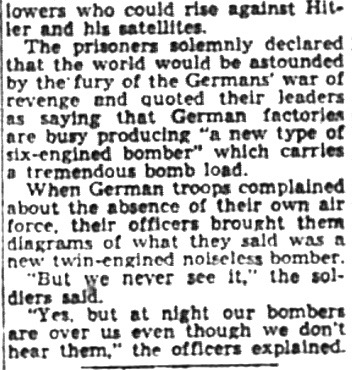"There's a War On" (Tough Slog). Berlin Feels the Hits.
Though the "War Labour Board" makes headlines, Canadian 'war losses'
in the Mediterranean theatre of war are posted as well
In 1943 the average Canadian citizen would know - in their bones - that Canada was deep into World War II, that Germany was feeling the strength of Allied punches, there was light at the end of the tunnel, but there was a long way to go.
Though there was hope in the future, that a major landing in western Europe would become a reality, there was also a further cost involved. Any news of the Canadian dead would always give readers pause, I am sure.
News in December is almost void of any connection to Canadians in Combined Operations. Three of four Canadian flotillas of landing craft had finished their battling to get troops and materiel of war onto Sicilian shores in July, and many members of RCNVR/Combined Ops were already back home.
The fourth flotilla, the 80th, had rested, recuperated and repaired landing crafts in August, 1943 on the island of Malta, had assisted with the significant job of transporting Canadian troops (in part) and all their supplies during the invasion of Italy beginning September 3 (Operation Baytown, from Messina to Reggio), and its members were now back in Canada as well. Many sailors arrived in Halifax on December 6 aboard the Aquitania, and enjoyed home leave before volunteering for further duty.
That being said, more news items related to World War II events that took place during December will continue to be presented here, as found in The Montreal Star (via the microfiche housed at the University of Western Ontario, London). I am searching for news re the arrival home of the 80th Flotilla, including my father, because that would provide a fitting conclusion to this research project - focussed on The Star - related to Canadians in Combined Ops and their duties and service in Italy.
Many Canadian readers in 1943 would say, "We know about D-Day North Africa, D-Day Sicily and D-Day Italy. But about D-Day Western Europe, when will it take place?"
The "most severe... the most costly" operations lie ahead, as we already know as modern day readers. Past costs or 'butcher's bills' will surely be eclipsed:
About the article above: Some Canadians in Combined Operations mention in memoirs that the landings with troops and supplies aboard their flat-bottomed crafts were far tougher in Sicily (Operation Husky) than in Italy (Operation Baytown). Sicilian landings were even tougher than at Dieppe for one Canadian stoker.
It is also known that Operation Baytown, at Reggio di Calabria (on the toe of Italy's boot) was far easier than Operation Avalanche, about one week later at Salerno (over 200 miles farther north on Italy's western coast).
Doug Harrison writes:
A signal came through, i.e., ‘do not fire on low flying aircraft, they are ours and towing gliders.’ What, in the dark? Next morning. as we slowly moved in, we saw gliders everywhere. I saw them sticking out of the water, crashed on land and in the vineyards. In my twenty-seven days there I did not see a glider intact. We started unloading supplies with our LCMs about a half mile off the beach and then the worst began - German bombers. We were bombed 36 times in the first 72 hours - at dusk, at night, at dawn and all day long, and they said we had complete command of the air.
We fired at everything. I saw P38s, German and Italian fighters and my first dogfights. Stukas blew up working parties on the beach once when I was only about one hundred feet out. Utter death and carnage.
Our American gun crews had nothing but coffee for three or four days and stayed close to their guns all the time. I give them credit.
Epus P. Murphy’s pet monkey went mad and we put it in a bag of sand meant to douse incendiary bombs and threw him over the side. The Russian Stoker on our ship, named Katanna, said Dieppe was never like this and hid under a winch. Shrapnel and bombs just rained down.
Epus P. Murphy’s pet monkey went mad and we put it in a bag of sand meant to douse incendiary bombs and threw him over the side. The Russian Stoker on our ship, named Katanna, said Dieppe was never like this and hid under a winch. Shrapnel and bombs just rained down.
"Dad, Well Done", Page 31
The 'tough slog' continues:
Another news clipping follows re "the butcher's bill". Numbers were tallied beginning on September 3, 1943, the first day of Operation Baytown. Canadians (RCNVR) who operated landing crafts not only helped move Monty's 8th Army but members of the Canadian Army as well, but I do not know if Canadian casualties are included here. As well, few sailors who operated landing crafts were killed or wounded. "Small crafts make small targets," said my father (Doug Harrison).
The landings in Italy must have been easier than in Sicily because Monty had time to write a book "soon after (he) landed with his British and Canadian troops in Italy":
The 5th and 8th Armies had been in Italy for three full months when the following cartoon appeared. I would think "Their (the Allied) Grip" in Italy would be considered pretty secure, but it was a small or narrow front (across the Italian peninsula) compared to all of Europe:
Hey, what's on at the movies?
Berlin was not alone in feeling the Allied hits from their bombing program:
The following GIANT headline tells quite the story!!
And the story is... don't believe everything you read or hear:
The GIANT headline and Tokio propaganda are found above
A map depicts the "Allied Grip"
"Canadian troops of the 8th Army" are mentioned below:
The following story reminds us of the power of propaganda:
The following is not propaganda. It's about productivity that helped win the war:
I wish I had this article when I lived back home with my parents. I would have known what to get my father for Christmas!
As they say, "close only counts in horseshoes" and "revenge is a dish best served cold" (or in cold water):
U-Boats took such a heavy toll for such a long time. Seamen would be encouraged, however, by advancements in radar, air coverage, and anything else that led to higher U-Boat losses:
Editor's Note: At this time (of preparing this post for the blog), the globe is under the threat of a pandemic, the COVID-19 virus. Certain messages are being repeated about staying indoors, practising social and physical distancing, etc. The flu of 1943 appears to be a Nazi strain:
By the time the following newspaper was issued, my father had been back in Canada for about five days with many of his close mates. I would like to think that on December 11 he was reading the following news on a train exiting Halifax and heading toward Montreal and Toronto and Woodstock, in that order.
The boys coming home after two years of service overseas would be as happy as a clam for the most part, at least as happy as the Quebecer below:
Much had changed from January, 1942 and December, 1943. The Canadians in Combined Ops suffered losses and heavy assaults and long hours and poor food and accommodation and making do with short resources while taking part in the Dieppe raid and subsequent invasions in North Africa, Sicily and Italy. They would say about the next article, "The tide is turning."
Have I mentioned that the battle in Italy was one tough slog?
Once back home my father was interviewed by a Brantford newspaper, and among other things, he encouraged people to 'write to the boys.'
"Anybody who has relatives overseas should write lots of letters," he advised. "The Canadian boys like to get mail. It's as welcome as pay day - in fact, in Italy it's even more welcome because they can't spend money there."
The Brantford Expositor, January 1944
Before he even said it, 1,000s of people were feeling the same way!
Let it be known that December 11, 1943 finished on a pretty positive note, unless you love your whisky and can only find tea.
More to follow from The Montreal Star.
Unattributed Photos GH























































No comments:
Post a Comment